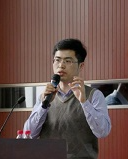主题演讲人
 Xiaxin Tao
Xiaxin Tao
Professor
School of Civil Engineering, Harbin Institute of Technology
Link:
http://homepage.hit.edu.cn/taoxinxia?lang=en
Speech Title: A Rustic Opinion on Test of PSHA Map in Sichuan Case of China
Abstract:Seismic zoning map is one of the important countermeasures against earthquake disasters in many earthquake countries in the world. In China, seismic zoning map plays a role of state standard, is the basis for all kinds of engineering structures taking engineering measures and all cities/regions planning for earthquake prevention and disaster reduction. The zoning maps issued in 1990 and 2001 were developed by means of the probabilistic seismic hazard assessment approach, so called as PSHA maps. If the PSHA map could be tested, and how to test it, is a problem with international debate. Obviously, it is inappropriate to adopt the map as the basis of seismic fortification, even a national standard, without any test. In the preliminary step to adopt the PSHA approach in preparing our zoning map, the Chinese scientists put forward that one of the key point of further research on the methodology is to find a way to test PSHA map. Taking the all destructive earthquakes occurred after the map issued as the objective criterion, the authors of this paper suggested two procedures to test a PSHA map, and a case study in Sichuan of China is presented in this paper as a rustic opinion
 Christophe Claramunt
Christophe Claramunt
Professor
Naval Academy Research Institute, France
 Zhenhao XU
Zhenhao XU
Professor
Urban Underground Space Engineering Department, Shandong University
Speech Title: Intelligent Lithology and Adverse Geology Identification in tunnelling
Abstract: Lithology variation zones and adverse geology often cause serious disasters in tunnelling. It is necessary and important to develop non-destructive, in-situ, fast and intelligent means of identification methods for lithology variation zones and adverse geology, so as to take corresponding countermeasures in advance to reduce and prevent geological disasters. Here we report and demonstrate some recent progress on deep learning-based methods for intelligent lithology and adverse geology identification in tunnelling. These methods are based on in-situ data collection (non-lab environment), deep learning and fusion analysis of images, element and mineral data of rocks. The proposed methods were successfully applied in some tunnel engineering and can also be used in similar surface geological surveying and subsurface mining and logging analysis in underground projects.
 Chien-Yuan Chen
Chien-Yuan Chen
Professor and Chairman
Department of Civil and Water Resources Engineering, National Chiayi University
Link:
https://www.ncyu.edu.tw/civil_eng/content.aspx?site_content_sn=26836
Speech Title: Climate Change and Initiation of Slope-Land Disasters in Taiwan
Abstract:Worldwide, global climate change has caused numerous disasters. Further, it has influenced the local climate of Taiwan, marked by a continuous increase in temperature. In this study, local climate changes and slope-land disasters occurring in Taiwan were analyzed statistically. Rainfall data obtained from plain and river basin areas were separated for the analysis. Local climate change influenced rainfall distribution driven by climate events. Typhoon-induced rains caused relatively fewer slope-land disasters than did other climate events such as Meiyu front, tropical low pressure, and southwesterly flow events during 2017–2019. The fewer occurrences of typhoons in Taiwan caused a decrease in rainfall distributed in river basin areas and fewer slope-land disasters. Seismic disturbances observed after the Chi-Chi earthquake in 1999 and the subsequent typhoon-induced torrential rains were attributed to an increase in potential debris flow creeks; however, climate events caused by non-typhoon-induced slope-land disasters were more frequent than those caused by typhoon-induced slope-land disasters in recent years
 Bin Zou
Bin Zou
Professor
College of Geoscience and Information Physics, Central South University
Speech Title: Detection of Soil Heavy Metal Contamination Using Remote Sensing Technology
Abstract: Soil heavy metal contamination has serious pressure on the ecological environment, especially in China. Efficient technologies for detecting the distribution of soil heavy metal contamination are therefore crucial for soil environmental monitoring and ecological remediation. Among them, due to the advantages of low cost, high efficiency, and large coverage, the hyperspectral remote sensing technology is gradually becoming a promising method for soil environmental monitoring. This report will firstly introduce the worldwide demands and transformations of research hotspots about soil heavy metal contamination in recent years. On this basis, the main progress of remote sensing based soil heavy metal contamination detection will be summarized and analyzed. Finally, future opportunities and challenges in this field are suggested.
 Ramesh Agarwal
Ramesh Agarwal
Professor
Washington University, USA
 Ahsan Habib
Ahsan Habib
Professor
Department of Chemistry University of Dhaka